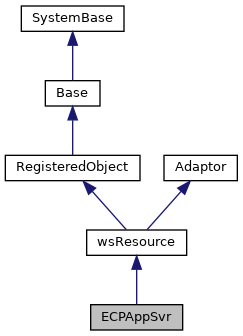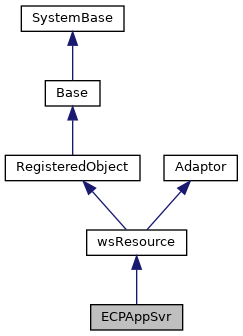This class represents system metrics captured for ECP Application Server activity. More...


Public Attributes | |
| ActConn | |
| The number of current active ECP connections from this Application Server. More... | |
| BlockAdd | |
| The number of Blocks added to local cache. More... | |
| BlockBuffPurge | |
| The number of Blocks purged by buffer allocation. More... | |
| BlockSvrPurge | |
| The number of Blocks purged as requested by a Data Server. More... | |
| ByteRcvd | |
| The number of Bytes received. More... | |
| ByteSent | |
| The number of Bytes sent. More... | |
| GloRef | |
| The number of remote Global "read" type references which were not found in the global cache. More... | |
| GloRefLocal | |
| The total number of Local global references. More... | |
| GloRefRemote | |
| The total number of Remote global references. More... | |
| GloUpdateLocal | |
| The number of Local global updates (Set, Kill, etc). More... | |
| GloUpdateRemote | |
| The number of Remote global updates (Set, Kill, etc). More... | |
| MaxConn | |
| The maximum possible number of ECP connections from this Application Server. More... | |
| ResponseConn | |
| The number of Data Server connections that responded for the ResponseTime. More... | |
| ResponseTime | |
| The response time of the currently connected ECP Data Server(s),. More... | |
| RoutineBuffLocal | |
| The number of Local routine buffer loads and saves. More... | |
| RoutineBuffRemote | |
| The number of Remote routine buffer loads and saves. More... | |
| RoutineCallLocal | |
| The number of Local routine calls. More... | |
| RoutineCallRemote | |
| The number of Remote routine calls. More... | |
This class represents system metrics captured for ECP Application Server activity.
Each property is a different metric. A class may be instantiated by calling the class method 'Sample', and then the current value of each property can be accessed.
For example:
s ref=##class(SYS.Stats.ECPAppSvr).Sample() w ref.GloRef ; display number of remote Global References requested by this Application Server
System stats for an ECP Application Server
| ActConn |
The number of current active ECP connections from this Application Server.
| BlockAdd |
The number of Blocks added to local cache.
| BlockBuffPurge |
The number of Blocks purged by buffer allocation.
| BlockSvrPurge |
The number of Blocks purged as requested by a Data Server.
| ByteRcvd |
The number of Bytes received.
Note that this is currently only a 32 bit integer and may overflow quickly on a busy system.
| ByteSent |
The number of Bytes sent.
Note that this is currently only a 32 bit integer and may overflow quickly on a busy system.
| GloRef |
The number of remote Global "read" type references which were not found in the global cache.
This number can be compared to the total number of remote read-only references (i.e. GloRefRemote - GloUpdateRemote) to measure the efficiency of the global caching.
| GloRefLocal |
The total number of Local global references.
| GloRefRemote |
The total number of Remote global references.
| GloUpdateLocal |
The number of Local global updates (Set, Kill, etc).
| GloUpdateRemote |
The number of Remote global updates (Set, Kill, etc).
| MaxConn |
The maximum possible number of ECP connections from this Application Server.
| ResponseConn |
The number of Data Server connections that responded for the ResponseTime.
| ResponseTime |
The response time of the currently connected ECP Data Server(s),.
measured as a decimal number in seconds.
If there are multiple connections, this number represents an overall response time for all Data Server connections. Running the Sample() method will attempt to 'sync' to all Data Servers, and returns the time after the last one has answered.
A return of zero ('0') indicates there were no active connections which were able to respond to the 'sync' request.
| RoutineBuffLocal |
The number of Local routine buffer loads and saves.
| RoutineBuffRemote |
The number of Remote routine buffer loads and saves.
| RoutineCallLocal |
The number of Local routine calls.
| RoutineCallRemote |
The number of Remote routine calls.